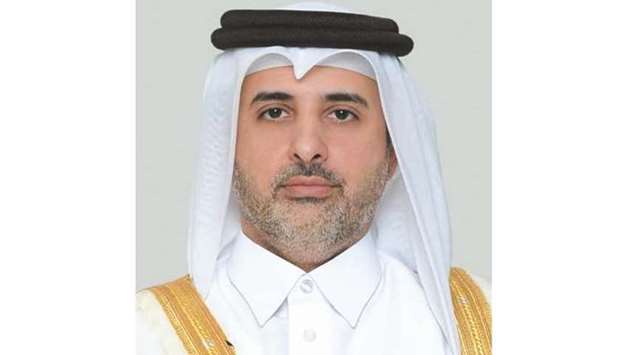Discussions “are ongoing” with different investors who are interested in establishing food processing plants inside Qatar’s Free Zones, according to HE the Minister of Municipality & Environment Abdulla bin Abdulaziz bin Turki al-Subaie.
The US-Qatar Business Council (USQBC), in its ‘Business Opportunity Report: Qatar’s Food Security’, stated that there are many organisations that are facilitating investments in Qatar, including Qatar Free Zones Authority and Hamad Port, among others.
“We have many alignments between strategies and plans of these entities,” said al-Subaie in the report. He also said the strategic stock facility at Hamad Port “is very autonomous and will become the main hub and gateway for trade between Qatar and the rest of the world.”
Al-Subaie said, “We also have programmes with the Free Zones to reduce all food wastage as well. We’re also aligning our strategy with the Hamad International Airport and their air cargo capacity.
“We have a large fleet of airplanes and we can be a hub for transiting foodstuffs, especially during a crisis, for both Qatar and the rest of the world. All of these plans are well-integrated and aligned together.”
While the government is stepping up its efforts to increase local production of food products, al-Subaie stated in the report that this “will not supercede the commercial relations and partnerships” with Qatar’s allies.
“Of course, part of our food security strategy is to enhance and increase the capacity of local production. With that in mind, even while improving our domestic capacity, we understand the need to maintain commercial relations with our partners everywhere.
“That’s a key part of our strategy. Food security doesn’t mean if you’re self-sufficient; you’re secure. We also need to prepare for a scenario where we need to switch from local production to international partnerships. We see this happening especially with fresh food,” the minister pointed out.
Al-Subaie also underscored the importance of keeping international relations “intact and very flexible,” in case there is a need to scale up or down. “We’d also look at other opportunities where it will complement that kind of relationship; for instance, a commercial agreement complemented by technology transfer,” he said.
According to al-Subaie, the three-year economic blockade has provided Qatar the experience to manage a crisis, thus preparing the country for challenges associated with the Covid-19 pandemic.
“We definitely learned the hard way because we had been subjected to a real scenario of crisis during the blockade, which helped us learn a lot. Since then we developed a lot of strategies and plans to deal with the crisis,” he said.
He added: “Because of this experience, we have been one of the least affected by Covid-19 in terms of food security. We already had all the plans, communications, strategies, strategic stocks, and supply chain in place at the onset of the pandemic. It was easy for us to respond effectively and smoothly. No one even noticed that there is any kind of shortage or any issue with food security.”
Ends
The US-Qatar Business Council (USQBC), in its ‘Business Opportunity Report: Qatar’s Food Security’, stated that there are many organisations that are facilitating investments in Qatar, including Qatar Free Zones Authority and Hamad Port, among others.
“We have many alignments between strategies and plans of these entities,” said al-Subaie in the report. He also said the strategic stock facility at Hamad Port “is very autonomous and will become the main hub and gateway for trade between Qatar and the rest of the world.”
Al-Subaie said, “We also have programmes with the Free Zones to reduce all food wastage as well. We’re also aligning our strategy with the Hamad International Airport and their air cargo capacity.
“We have a large fleet of airplanes and we can be a hub for transiting foodstuffs, especially during a crisis, for both Qatar and the rest of the world. All of these plans are well-integrated and aligned together.”
While the government is stepping up its efforts to increase local production of food products, al-Subaie stated in the report that this “will not supercede the commercial relations and partnerships” with Qatar’s allies.
“Of course, part of our food security strategy is to enhance and increase the capacity of local production. With that in mind, even while improving our domestic capacity, we understand the need to maintain commercial relations with our partners everywhere.
“That’s a key part of our strategy. Food security doesn’t mean if you’re self-sufficient; you’re secure. We also need to prepare for a scenario where we need to switch from local production to international partnerships. We see this happening especially with fresh food,” the minister pointed out.
Al-Subaie also underscored the importance of keeping international relations “intact and very flexible,” in case there is a need to scale up or down. “We’d also look at other opportunities where it will complement that kind of relationship; for instance, a commercial agreement complemented by technology transfer,” he said.
According to al-Subaie, the three-year economic blockade has provided Qatar the experience to manage a crisis, thus preparing the country for challenges associated with the Covid-19 pandemic.
“We definitely learned the hard way because we had been subjected to a real scenario of crisis during the blockade, which helped us learn a lot. Since then we developed a lot of strategies and plans to deal with the crisis,” he said.
He added: “Because of this experience, we have been one of the least affected by Covid-19 in terms of food security. We already had all the plans, communications, strategies, strategic stocks, and supply chain in place at the onset of the pandemic. It was easy for us to respond effectively and smoothly. No one even noticed that there is any kind of shortage or any issue with food security.”
Ends


